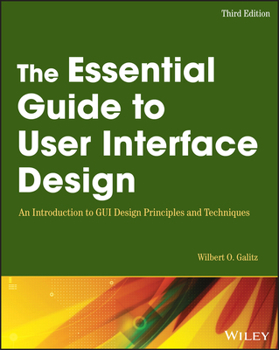The Essential Guide to User Interface Design: An Introduction to GUI Design Principles and Techniques
Select Format
Select Condition 
Book Overview
Bringing together the results of more than 300 new design studies, an understanding of people, knowledge of hardware and software capabilities, and the author's practical experience gained from 45 years of work with display-based systems, this book addresses interface and screen design from the user's perspective. You will learn how to create an effective design methodology, design and organize screens and Web pages that encourage efficient comprehension...
Format:Paperback
Language:English
ISBN:0470053429
ISBN13:9780470053423
Release Date:April 2007
Publisher:Wiley
Length:896 Pages
Weight:2.90 lbs.
Dimensions:1.9" x 7.4" x 9.2"
Customer Reviews
5 ratings
telephone book of textual above averageness
Published by Thriftbooks.com User , 16 years ago
User Interface Design is a very complicated subject. This colossal book mimics closely a telephone book with a large amount of text-heaviness. If you get over the fact that there are a wall of words on most pages, the book actually has some great content and ideas. It generally talks about user interfaces, as opposed to web interface/design. It talks more about the distinction between them and what their purposes are. It talks about different controls and the best solution for a problem that a client has. You find out a lot of things that are like, "Wow, I never thought about that, but that makes so much sense". I am mostly a web designer, but knowing the purpose of GUIs is a great skill since there is going to be a boom in RIAs(Rich Internet Applications) in the coming years. It probably could have been condensed quite a bit, but there is a lot more good than bad, so I give it four stars.
Useful to understand the why
Published by Thriftbooks.com User , 16 years ago
Mr. Galitz's reasons for using design standards and the detailed consequences of poor design are backed up by reasearch. He gives specific recommendations for standards such as typefaces, point size, label and caption styles, etc. He explains and uses a good shorthand throughout the book for items as "signal" versus "noise." This is handy to quickly distinguish between things that are good/favorable/communicative/useful compared to things that are interfering/obstructive/not useful. This is an excellent book for anyone wanting to understand the "why" of good screen design and then learn the "what."
Superb book for information designers
Published by Thriftbooks.com User , 16 years ago
As a practising information designer I found this to be an excellent source of information, especially for students. This book takes people back to basics, something that a lot of modern IT "professionals" overlook.
Required for anyone who is serious about interface design
Published by Thriftbooks.com User , 21 years ago
The field of interface and interaction design is formally known as Human-Computer Interaction (HCI). It is significant that a large amount of HCI deals with non-programming issues such as psychological approaches to end-user experience, social manners of the audience, and more. The Essential Guide to User Interface Design provide a comprehensive overview of the essentials of interface design. The Essential Guide to User Interface Design focuses on the actual design of the GUI. While Interaction Design: Beyond Human-Computer Interaction explains why a user may react a specific way to a GUI, The Essential Guide to User Interface Design details the principles and techniques effective for GUI design. Although the book does focus on end-user interaction with systems, the bulk of the book focuses on the actual interface design and layout. The book provides numerous examples of how small changes can affect end-user productivity, including how the selection of the appropriate component can be used to make a more efficient application. From a business perspective, Chapter 1 shows how one company saved a fortune in operational costs by simply redesigning one window in their application. While ROI is generally not a case for better GUI design, it is a compelling byproduct, nonetheless. The book is divided into two parts. The first two chapters make up Part 1 and provide an overview of the importance of the user interface. The basics of HCI and GUIs are also detailed in this section. Part 2 constitutes the bulk of the book (Chapters 3 through 16). In Part 2, the author describes 14 steps involved with the user interface design process. Steps 1 and 2 involve understanding who the end user is and the business function. Steps 3 - 14 go into the nitty gritty of interface design and address menus, windows, control selections, text and messages, and more. The Essential Guide to User Interface Design also provides screen shots that illustrate how to properly design effective user interfaces.
Best Intro Around
Published by Thriftbooks.com User , 22 years ago
This book is terrific--the most comprehensive treatment I've found on user interface design. I teach a course at a community college on user interface and Web design, and this provides a really clear and complete introduction. I will defintely be using it next semester.





